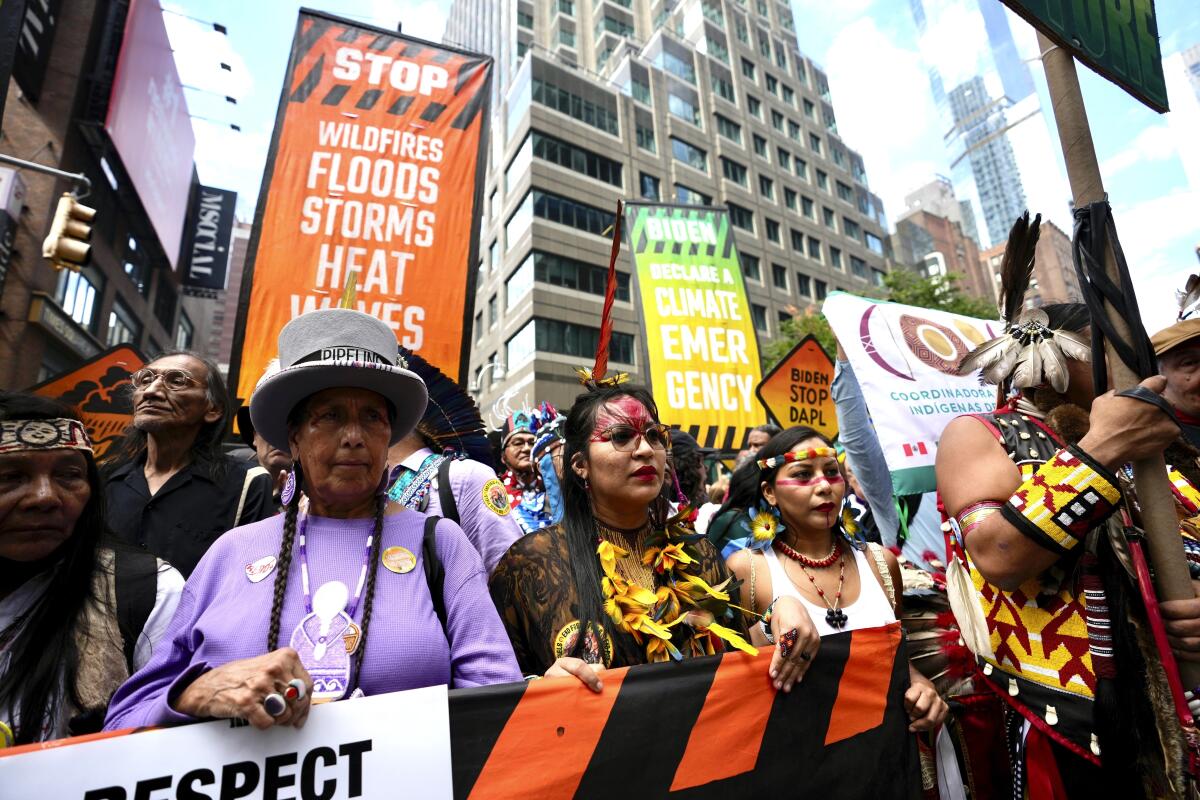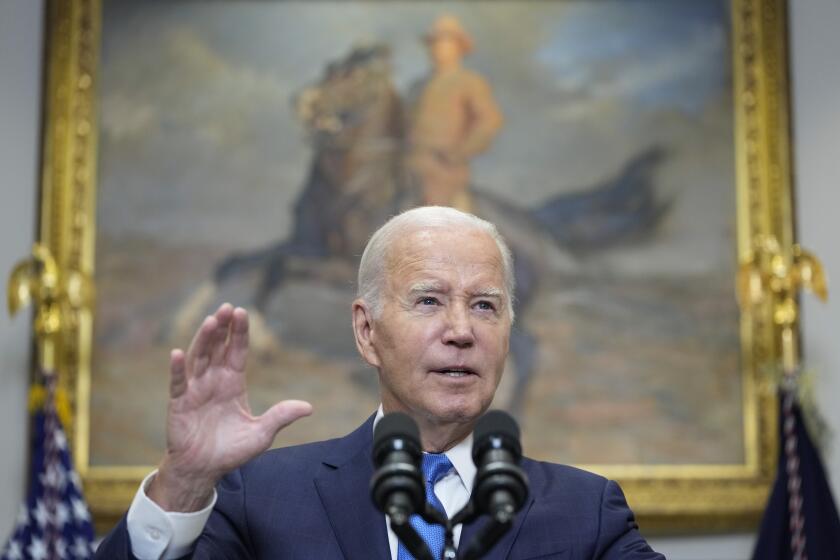Tens of thousands march in New York, demanding end to warming-causing fossil fuels

NEW YORK — Yelling that the future and their lives depend on ending fossil fuels, tens of thousands of protesters on Sunday kicked off a week where leaders will try once again to curb climate change primarily caused by coal, oil and natural gas.
But protesters say it’s not going to be enough. And they aimed their wrath directly at President Biden, urging him to stop approving new oil and gas projects, phase out current ones and declare a climate emergency with larger executive powers.
“We hold the power of the people, the power you need to win this election,” 17-year-old Emma Buretta of Brooklyn and the youth protest group Fridays for Future said. “If you want to win in 2024, if you do not want the blood of my generation to be on your hands, end fossil fuels.”
The March to End Fossil Fuels featured such politicians as Rep. Alexandria Ocasio-Cortez (D-N.Y.) and actors Susan Sarandon, Ethan Hawke, Edward Norton, Kyra Sedgewick and Kevin Bacon. But the real action on Broadway was where protesters crowded the street, pleading for a better but not-so-hot future. It served as the opening salvo to New York’s Climate Week, where world leaders in business, politics and the arts get together to try to save the planet, highlighted by a new special United Nations summit Wednesday.
Climate activists spray orange paint on Berlin’s Brandenburg Gate to urge the German government to take more urgent action against climate change.
But many of the leaders of the countries that cause the most heat-trapping carbon pollution will not be attending the United Nations gathering or hear the protesters’ plea. And they won’t speak at the summit that was organized by U.N. Secretary-General Antonio Guterres in a way that only countries that promise new concrete action are invited to speak.
Organizers estimated 75,000 people took part in Sunday’s march.
Among them was 8-year-old Athena Wilson from Boca Raton, Fla. She and her mother, Maleah, flew in just for the protest.
“Because we care about our planet,” Athena said. “I really want the Earth to feel better.”
People in the South, especially where the oil industry is, and the global south, “have not felt heard,” said 23-year-old Alexandria Gordon, who is originally from Houston. “It is frustrating.”
The United Auto Workers strike has exposed tensions between President Biden’s goals of fighting climate change and supporting unions.
Protest organizers emphasized how let down they felt that Biden, whom many of them supported in 2020, has overseen increased drilling for oil and fossil fuels.
“President Biden, our lives depend on your actions today,” said Louisiana environmental activist Sharon Lavigne. “If you don’t stop fossil fuels our blood is on your hands.”
Nearly one-third of the world’s planned drilling for oil and gas between now and 2050 is by U.S. interests, environmental activists calculate. Over the past 100 years, the United States has put more heat-trapping carbon dioxide in the atmosphere than any other country, though China now emits more carbon pollution on an annual basis.
“You need to phase out fossil fuels to survive our planet,” said Jean Su, a march organizer and energy justice director for the Center for Biological Diversity.
Toward a more sustainable California
Get Boiling Point, our newsletter exploring climate change, energy and the environment, and become part of the conversation — and the solution.
You may occasionally receive promotional content from the Los Angeles Times.
Marchers and speakers spoke of increasing urgency and fear of the future. The actress known as V, formerly Eve Ensler, was scheduled to premiere the anthem “Panic” from her new climate change-oriented musical scheduled for next year.
Climate protests have been going on worldwide for several years, but this march seemed to have more of a sense of urgency and frustration, said Anna Fels, a New Yorker who has been protesting and marching since the Vietnam War. And the march, unlike others, was more clearly focused on fossil fuels.
Signs included “Fossil fuels are killing us” and “I want a fossil free future” and “keep it in the ground.”
That’s because leaders don’t want to acknowledge “the elephant in the room,” said Ugandan climate activist Vanessa Nakate. “The elephant is that fossil fuels are responsible for the crisis. We can’t eat coal. We can’t drink oil, and we can’t have any new fossil fuel investments.”
But oil and gas industry officials said they and their products are vital to the economy.
“We share the urgency of confronting climate change together without delay; yet doing so by eliminating America’s energy options is the wrong approach and would leave American families and businesses beholden to unstable foreign regions for higher cost and far less reliable energy,” said American Petroleum Institute Senior Vice President Megan Bloomgren.
More to Read
Sign up for Essential California
The most important California stories and recommendations in your inbox every morning.
You may occasionally receive promotional content from the Los Angeles Times.












